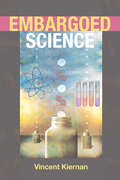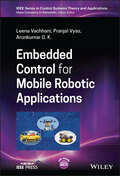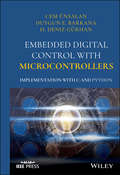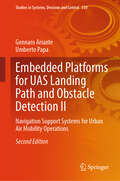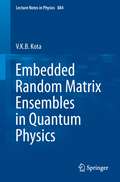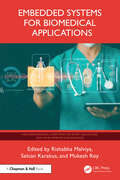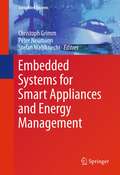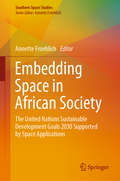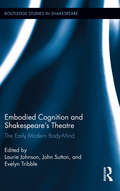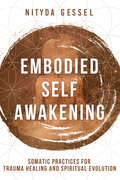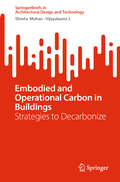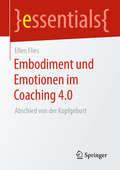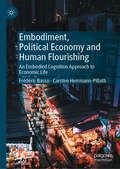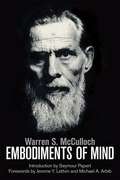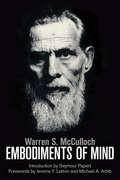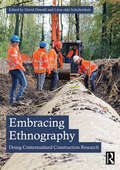- Table View
- List View
Elwha: A River Reborn
by Lynda V. MapesIn the fall of 2011, the Times was on hand when a Montana contractor removed the first pieces from two concrete dams on the Elwha River which cuts through the Olympic range. It was the beginning of the largest dam removal project ever undertaken in North America—one dam was 200 feet tall—and the start of an unprecedented attempt to restore an entire ecosystem. More than 70 miles of the Elwha and its tributaries course from the mountain headwaters to clamming beaches on the Strait of Juan de Fuca. Through interviews, field work, archival and historical research, and photojournalism, The Seattle Times has explored and reported on the dam removal, the Elwha ecosystem, its industrialization, and now its renewal. Elwha: A River Reborn is based on these feature articles.
Email and Commercial Correspondence: A Guide to Professional English (Guides to Professional English)
by Adrian WallworkIf you write emails and letters as part of your work, then this book is for you. By applying the suggested guidelines, you will stand a much greater chance of getting the desired reply to your emails in the shortest time possible.Some of the key guidelines covered include:Write meaningful subject lines - otherwise recipients may not even open your mail.Always put the most important point in the first line - otherwise the reader may not read it.Be concise and only mention what is truly relevant. Write the minimum amount possible - you will also make fewer mistakes!Be a little too formal than too informal - you don’t want to offend anyone.If you have two long important things to say, say them in separate emails.Give clear instructions and reasonable deadlines.If you need people to cooperate with you, it is essential to highlight the benefits for them of cooperating with you.Empathize with your recipient's busy workload.Never translate typical phrases literally - learn equivalent phrases.The book concludes with a chapter of useful phrases. There is also a brief introduction for trainers on how to teach Business / Commercial English.
Emanuel Swedenborg
by Inge JonssonLife and works of the mystic Emanuel Swedenborg (1688-1772). 224 pages. Academic style - not light reading.
Embargoed Science
by Vincent KiernanThe popular notion of a lone scientist privately toiling long hours in a laboratory, striking upon a great discovery, and announcing it to the world is a romanticized fiction. Vincent Kiernan's Embargoed Science reveals the true process behind science news: an elite few scholarly journals control press coverage through a mechanism known as an embargo. The journals distribute advance copies of their articles to hundreds and sometimes thousands of journalists around the world, on the condition that journalists agree not to report their stories until a common time, several days later. When the embargo lifts, airwaves and newspaper pages are flooded with stories based on the journal's latest issue. In addition to divulging the realities behind this collusive practice, Kiernan offers an unprecedented exploration of the embargo's impact on public and academic knowledge of science and medical issues. He surveys twenty five daily U.S. newspapers and relates his in-depth interviews with reporters to examine the inner workings of the embargo and how it structures our understanding of news about science. Kiernan ultimately argues that this system fosters "pack journalism" and creates an unhealthy shield against journalistic competition. The result is the uncritical reporting of science and medical news according to the dictates of a few key sources.
Embedded Control for Mobile Robotic Applications (IEEE Press Series on Control Systems Theory and Applications)
by Leena Vachhani Pranjal Vyas Arunkumar G. K.An all-in-one resource for designing and implementing embedded control in mobile robotics In Embedded Control for Mobile Robotic Applications, a distinguished trio of researchers delivers an authoritative and fulsome resource for understanding embedded control and robotics. The book includes coverage of a variety of embedded platforms, their use in controller implementation, stability analyses of designed controllers, and two new approaches for designing embedded controllers. The authors offer a full chapter on Field-Programmable-Gate-Array (FPGA) architecture development for controller design that is perfect for both practitioners and students taking robotics courses and provide a companion website that includes MATLAB codes for simulation and embedded platform-specific code for mobile robotic applications (in Embedded C and Verilog). The two approaches discussed by the authors—the top-down methodology and the bottom-up methodology—are of immediate practical utility to both practicing professionals in the field and students studying control applications and mobile robotics. The book also offers: A thorough introduction to embedded control, including processor, IC, and design technology, as well as a discussion of limitations in embedded control design Comprehensive explorations of the bottom-up and top-down methods, including computations using CORDIC, interval arithmetic, sliding surface design, and switched nonlinear systems Practical discussions of generic FPGA architecture design, including Verilog, PID controllers, DC motors and Encoder, and a systematic approach for designing architecture using FSMD In-depth examinations of discrete-time controller design, including the approximation to discrete-time transfer function and embedded implementation stability Perfect for practitioners working in embedded control design and control applications in robotics, Embedded Control for Mobile Robotic Applications will also earn a place in the libraries of academicians, researchers, senior undergraduate students, and graduate students in these fields.
Embedded Digital Control with Microcontrollers: Implementation with C and Python (Wiley - IEEE)
by Cem Unsalan Duygun E. Barkana H. Deniz GurhanExplore a concise and practical introduction to implementation methods and the theory of digital control systems on microcontrollers Embedded Digital Control: Implementation on ARM Cortex-M Microcontrollers delivers expert instruction in digital control system implementation techniques on the widely used ARM Cortex-M microcontroller. The accomplished authors present the included information in three phases. First, they describe how to implement prototype digital control systems via the Python programming language in order to help the reader better understand theoretical digital control concepts. Second, the book offers readers direction on using the C programming language to implement digital control systems on actual microcontrollers. This will allow readers to solve real-life problems involving digital control, robotics, and mechatronics. Finally, readers will learn how to merge the theoretical and practical issues discussed in the book by implementing digital control systems in real-life applications. Throughout the book, the application of digital control systems using the Python programming language ensures the reader can apply the theory contained within. Readers will also benefit from the inclusion of: A thorough introduction to the hardware used in the book, including STM32 Nucleo Development Boards and motor drive expansion boards An exploration of the software used in the book, including MicroPython, Keil uVision, and Mbed Practical discussions of digital control basics, including discrete-time signals, discrete-time systems, linear and time-invariant systems, and constant coefficient difference equations An examination of how to represent a continuous-time system in digital form, including analog-to-digital conversion and digital-to-analog conversion Perfect for undergraduate students in electrical engineering, Embedded Digital Control: Implementation on ARM Cortex-M Microcontrollers will also earn a place in the libraries of professional engineers and hobbyists working on digital control and robotics systems seeking a one-stop reference for digital control systems on microcontrollers.
Embedded Platforms for UAS Landing Path and Obstacle Detection II: Navigation Support Systems for Urban Air Mobility Operations (Studies in Systems, Decision and Control #530)
by Umberto Papa Gennaro ArianteThis book reports on the design and development of a system that assists remote pilots during navigation. It focuses on the design and development of a ground station that assists remote pilots during maneuvers such as take-off or landing procedures, in case a high accuracy is required or the GNSS signal is lost. Continuing the tradition of the previous volume, and being its revised edition, this book covers the latest UAS regulations together with updated strategies for finding the best and safest trajectory and landing site, with a special focus on urban air mobility applications. It describes the system’s components, such as the LiDAR sensor, the temperature and humidity sensors, the Raspberry Pi 3 controller, and the Bluetooth Low Energy Transmitter, in detail. Further, it discusses the experimental tests carried out in both controlled laboratory settings and real-world environments. All in all, this book offers a timely survey of both regulations of and electronics design for unmanned aircraft systems, with extensive information on new methods and technologies for the development of Detect and Avoid systems for unmanned aerial vehicles.
Embedded Random Matrix Ensembles in Quantum Physics
by V.K.B. KotaAlthough used with increasing frequency in many branches of physics, random matrix ensembles are not always sufficiently specific to account for important features of the physical system at hand. One refinement which retains the basic stochastic approach but allows for such features consists in the use of embedded ensembles. The present text is an exhaustive introduction to and survey of this important field. Starting with an easy-to-read introduction to general random matrix theory, the text then develops the necessary concepts from the beginning, accompanying the reader to the frontiers of present-day research. With some notable exceptions, to date these ensembles have primarily been applied in nuclear spectroscopy. A characteristic example is the use of a random two-body interaction in the framework of the nuclear shell model. Yet, topics in atomic physics, mesoscopic physics, quantum information science and statistical mechanics of isolated finite quantum systems can also be addressed using these ensembles. This book addresses graduate students and researchers with an interest in applications of random matrix theory to the modeling of more complex physical systems and interactions, with applications such as statistical spectroscopy in mind.
Embedded Systems for Biomedical Applications (High-Performance Computing for Smart Healthcare)
by Rishabha Malviya Selcan Karakuş Mukesh RoyThis book is an essential guide to the constantly changing environment of embedded systems in healthcare in a world where the convergence of technology and healthcare is becoming increasingly important. It further explains different scenarios corresponding to the latest technologies in the healthcare system for early diagnosis, enhanced treatment, and cure of diseases, including remote patient monitoring, cardiac monitoring, and deep learning for remediation.Features:• Emphasizes how embedded systems contribute to clinical care by facilitating personalized treatment and informed decision-making for healthcare professionals.• Highlights the role of embedded systems in tracking treatment progress, enabling healthcare professionals to monitor patient responses and adjust treatment plans accordingly.• Explores the application of embedded systems in remote patient monitoring, allowing for continuous health monitoring outside traditional healthcare settings.• Presents the integration of deep learning and telecommunication technology with embedded systems, optimizing their efficiency and utilization in biomedical applications.• Offers insights into future prospects for advancing biomedical applications through embedded systems, providing a roadmap for further innovation and development in the field.This reference work is useful for scholars and professionals interested in the applications and optimization of emerging smart technologies in the field of healthcare.
Embedded Systems for Smart Appliances and Energy Management
by Peter Neumann Stefan Mahlknecht Christoph GrimmThis book provides a comprehensive introduction to embedded systems for smart appliances and energy management, bringing together for the first time a multidisciplinary blend of topics from embedded systems, information technology and power engineering. Coverage includes challenges for future resource distribution grids, energy management in smart appliances, micro energy generation, demand response management, ultra-low power stand by, smart standby and communication networks in home and building automation.
Embedding STEAM in Early Childhood Education and Care
by Susanne Garvis Caroline CohrssenThis book approaches STEAM (Science, Technology, Engineering, the Arts and Mathematics) in early childhood education from multiple angles. It focuses on the teaching and learning of children from two years of age to the early years of school. Proponents of STEAM describe how it can create opportunities for children to learn creatively, and various chapter authors make strong connections between discipline areas within the context of an informal curriculum. Others advocate for an integrated STEM, rather than STEAM, approach. With a light touch on theory and a focus on how to embed STE(A)M in an integrated early childhood curriculum, the editors and contributors examine the STEAM versus STEM question from multiple angles. The chapters provide helpful frameworks for parents, teachers and higher education institutions, and make practical suggestions of ways to support young children’s inquiry learning. Drawing on pedagogy and research from around the world, this book will be of interest to scholars of STEAM education, early childhood educators, students of early childhood education and parents of young children.
Embedding Space in African Society: The United Nations Sustainable Development Goals 2030 Supported by Space Applications (Southern Space Studies)
by Annette FroehlichThis book provides a detailed insight into how space and its applications are embedded, and can be further embedded, into African society in support of the SDGs, while taking into account the specific features, needs, and diversity of that society.Contributions drawn from across the continent and further afield provide analyses of the particular social situations in a variety of different African countries and regions, and highlight areas where space applications support the SDGs, and where they can further do so. The chapters cover a wide array of relevant and timely topics including basic needs like water quality, education, and capacity building, as well as financial, security, and legal aspects, together with facets of space technologies and infrastructure in Africa. Embedding Space in African Society will be of great interest to students and professionals in sustainable development, governance, and space studies.
Embodied Cognition and Shakespeare's Theatre: The Early Modern Body-Mind (Routledge Studies in Shakespeare)
by Evelyn Tribble Laurie Johnson John SuttonThis collection considers issues that have emerged in Early Modern Studies in the past fifteen years relating to understandings of mind and body in Shakespeare’s world. Informed by The Body in Parts, the essays in this book respond also to the notion of an early modern ‘body-mind’ in which Shakespeare and his contemporaries are understood in terms of bodily parts and cognitive processes. What might the impact of such understandings be on our picture of Shakespeare’s theatre or on our histories of the early modern period, broadly speaking? This book provides a wide range of approaches to this challenge, covering histories of cognition, studies of early modern stage practices, textual studies, and historical phenomenology, as well as new cultural histories by some of the key proponents of this approach at the present time. Because of the breadth of material covered, full weight is given to issues that are hotly debated at the present time within Shakespeare Studies: presentist scholarship is presented alongside more historically-focused studies, for example, and phenomenological studies of material culture are included along with close readings of texts. What the contributors have in common is a refusal to read the work of Shakespeare and his contemporaries either psychologically or materially; instead, these essays address a willingness to study early modern phenomena (like the Elizabethan stage) as manifesting an early modern belief in the embodiment of cognition.
Embodied Self Awakening: Somatic Practices for Trauma Healing and Spiritual Evolution
by Nityda GesselAn offering to be with, and to turn toward, the feelings from which we instinctively recoil. We have learned how to suppress our pain and deny its presence, but when we fight against our internal turmoil, glimmers of peace are short-lived. Rejecting our suffering is not a sustainable solution because trauma is held in the body. In this book, Nityda Gessel invites readers on a journey toward lasting freedom, with insights and experiential practices that marry the wisdom of Buddhist psychology, yogic teachings, and Indigenous understanding with somatic psychotherapy and neuroscience. When we heal, our actions and attitudes are not hijacked by our nervous systems as easily. We begin to feel more comfortable in our bodies; more at peace, awake, and free. With Gessel’s invitation, readers will learn to look out into the world, and see more than their own trauma reflected back.
Embodied and Operational Carbon in Buildings: Strategies to Decarbonize (SpringerBriefs in Architectural Design and Technology)
by Vijayalaxmi J. Shveta MohanThis book offers the basics of embodied and operational carbon while discussing the inclusion of carbon emission in the GBRS at global and national level. This book also critically explores the important topic of embodied and operational carbon of buildings with insights on the strategies to measure and reduce embodied carbon in buildings through a case study and application approach. This approach assesses the impact of embodied carbon on the choice of structural systems, alternate building materials, alternate building technologies and air conditioning system. The impact of these alternate measures in reducing embodied and operational carbon is analyzed by demonstrating its use on a base case building, which is similar to an existing office building in India. The quantified data enables architects and designers to make early design decisions for a more environmentally sensitive approache to sustainable building designs. This book is a valuable resource for students, researchers, and practicing architects in understanding evidence based repercussions of structural systems, use of materials, technology and air conditioning systems to design green and sustainable buildings.
Embodiment und Emotionen im Coaching 4.0: Abschied von der Kopfgeburt (essentials)
by Ellen FliesDie Zukunft des Coachings ist spannender denn je. Führungskräfte sollen einen agilen und transformativen Führungsstil einsetzen und gefragt sind Führungskräfte, die Empathie, Authentizität und Beziehungsfähigkeit mitbringen. Das neurowissenschaftlich fundierte Coaching-Format SBEAT® (Strategisch-Behavioral-Emotionsaktivierendes-Training) vermittelt auf eindrückliche Weise, wie diese für Führung zentralen Skills entwickelt und trainiert werden können. Der Schlüssel liegt in gelingender Emotionsregulation. Emotionen sind wichtige Ressourcen. Sie energetisieren unser Handeln. Sie determinieren unser Entscheiden und wirken gravierend auf persönliches Wohlergehen und auf die Beziehungsgestaltung ein. Lernen Sie in diesem essential die Arbeitsweise im SBEAT® kennen. Erfahren Sie, wie schnell und nachhaltig die Arbeit mit Embodiment funktioniert.
Embodiment, Political Economy and Human Flourishing: An Embodied Cognition Approach to Economic Life
by Carsten Herrmann-Pillath Frédéric BassoThis book presents embodied economics as a foundational alternative to behavioral economics and other projects integrating economics and psychology inspired by the computational paradigm. The 20th century witnessed the disembodiment of economic models through the intensification of mathematization and formal abstraction in economics. Even proponents of an embodied approach to cognition, such as Hayek, paradoxically championed the abstract market order as a disembodied superhuman intelligence. In the wake of groundbreaking perspectives in cognitive and social sciences, which have helped to rethink the fundamental building blocks of economics, agency and institutions, this title takes a radical turn towards embodiment. Reinstating economics as political economy, embodied economics motivates a critique of capitalism based on the analysis of disembodiment through abstraction and reactivates key critical insights into the anthropology put forward by the young Marx about contemporary economics and its conceptualizations of money, property, and labor. Based on this analysis, the authors envision a concrete utopia for an economic order centered on human dignity and care for life on Earth. This book contributes to recent discussions about behavioral, experimental and neuroeconomics and addresses a transdisciplinary audience in the social and behavioral sciences, philosophy, and the humanities.
Embodiments of Mind
by Michael A. Arbib Jerome Y. Lettvin Seymour A. Papert Warren S. MccullochWarren S. McCulloch was an original thinker, in many respects far ahead of his time. McCulloch, who was a psychiatrist, a philosopher, a teacher, a mathematician, and a poet, termed his work "experimental epistemology." He said, "There is one answer, only one, toward which I've groped for thirty years: to find out how brains work." Embodiments of Mind, first published more than fifty years ago, teems with intriguing concepts about the mind/brain that are highly relevant to recent developments in neuroscience and neural networks. It includes two classic papers coauthored with Walter Pitts, one of which applies Boolean algebra to neurons considered as gates, and the other of which shows the kind of nervous circuitry that could be used in perceiving universals. These first models are part of the basis of artificial intelligence.Chapters range from "What Is a Number, that a Man May Know It, and a Man, that He May Know a Number," and "Why the Mind Is in the Head," to "What the Frog's Eye Tells the Frog's Brain" (with Jerome Lettvin, Humberto Maturana, and Walter Pitts), "Machines that Think and Want," and "A Logical Calculus of the Ideas Immanent in Nervous Activity" (with Walter Pitts). Embodiments of Mind concludes with a selection of McCulloch's poems and sonnets. This reissued edition offers a new foreword and a biographical essay by McCulloch's one-time research assistant, the neuroscientist and computer scientist Michael Arbib.
Embodiments of Mind (The\mit Press Ser.)
by Warren S. McCullochWritings by a thinker—a psychiatrist, a philosopher, a cybernetician, and a poet—whose ideas about mind and brain were far ahead of his time.Warren S. McCulloch was an original thinker, in many respects far ahead of his time. McCulloch, who was a psychiatrist, a philosopher, a teacher, a mathematician, and a poet, termed his work “experimental epistemology.” He said, “There is one answer, only one, toward which I've groped for thirty years: to find out how brains work.” Embodiments of Mind, first published more than fifty years ago, teems with intriguing concepts about the mind/brain that are highly relevant to recent developments in neuroscience and neural networks. It includes two classic papers coauthored with Walter Pitts, one of which applies Boolean algebra to neurons considered as gates, and the other of which shows the kind of nervous circuitry that could be used in perceiving universals. These first models are part of the basis of artificial intelligence.Chapters range from “What Is a Number, that a Man May Know It, and a Man, that He May Know a Number,” and “Why the Mind Is in the Head,” to “What the Frog's Eye Tells the Frog's Brain” (with Jerome Lettvin, Humberto Maturana, and Walter Pitts), “Machines that Think and Want,” and “A Logical Calculus of the Ideas Immanent in Nervous Activity” (with Walter Pitts). Embodiments of Mind concludes with a selection of McCulloch's poems and sonnets. This reissued edition offers a new foreword and a biographical essay by McCulloch's one-time research assistant, the neuroscientist and computer scientist Michael Arbib.
Embodying Art: How We See, Think, Feel, and Create
by Chiara CappellettoIn recent years, neuroscientists have made ambitious attempts to explain artistic processes and spectatorship through brain imaging techniques. But can brain science really unravel the workings of art? Is the brain in fact the site of aesthetic appreciation?Embodying Art recasts the relationship between neuroscience and aesthetics and calls for shifting the focus of inquiry from the brain itself to personal experience in the world. Chiara Cappelletto presents close readings of neuroscientific and philosophical scholarship as well as artworks and art criticism, identifying their epistemological premises and theoretical consequences. She critiques neuroaesthetic reductionism and its assumptions about a mind/body divide, arguing that the brain is embodied and embedded in affective, cultural, and historical milieus.Cappelletto considers understandings of the human brain encompassing scientific, philosophical, and visual and performance arts discourses. She examines how neuroaesthetics has constructed its field of study, exploring the ways digital renderings and scientific data have been used to produce the brain as a cultural and visual object. Tracing the intertwined histories of brain science and aesthetic theory, Embodying Art offers a strikingly original and profound philosophical account of the human brain as a living artifact.
Embracing Ethnography: Doing Contextualised Construction Research
by David Oswald Léon Olde ScholtenhuisThis book calls for those interested in robust construction research to embrace ethnography – in all its forms, including rapid ethnographies, ethnographic-action research, autoethnography, as well as longer-term ethnographies.The diversification of ethnographic approaches, as well as ethnographers, will lead to rich insights that can advance the industry theoretically and practically. We share experiences, key considerations and recommendations from leading construction ethnographic researchers from around the world to provide discussion, reflection and understanding into doing ethnography in the construction industry.This book is aimed at academics, students, consultants, editors, reviewers, policymakers, funders and others interested in robust research in the construction industry and built environment but will also be useful for those undertaking research within organisations in other industries.
Embracing Evolution: How Understanding Science Can Strengthen Your Christian Life
by Matthew Nelson HillChristians often have a complicated relationship with science—especially when it comes to evolution.helpEmbracing Evolution
Embracing Hope After Traumatic Brain Injury: Finding Eden (After Brain Injury: Survivor Stories)
by Michael S. ArthurThis important book provides a firsthand account of a university professor who experienced traumatic brain injury. It tells the story of Michael Arthur, who had recently accepted a position as vice principal of a new high school. After only two weeks on the job, he was involved in a car accident while driving through an intersection in northern Utah. Through his personal account, he takes the reader into the dark interworkings of his mind as he tries to cope with his new reality. He provides insight into how he learned how to process information and even speak without stumbling on his words while also sharing how his significant relationships suffered as he tried to navigate the restless seas of doubt while trying to circumvent his unyielding symptoms. The book is about finding optimism and gaining insight into the struggles of the brain-injured patient and about trying to understand the perspectives of loved ones who can’t quite grasp the idea of an invisible injury. From the sudden onset of garbled speech to the challenges of processing information, the changing dynamic of the author’s life is highlighted to help family members and healthcare workers better understand.
Embracing Indigenous Knowledge in Science and Medical Teaching
by Mariana G. HewsonThe focus of the book is on different ways of knowing: the western scientific way (reductionist, dualistic and materialist) versus the indigenous approach (holistic, non-dualistic, and spiritual). It discusses both science and medicine in the context of the challenges experienced in introducing science and medicine into Africa through imperialism, colonization, and globalization. It looks at selected indigenous African paradigms, the dominant western paradigms, and the practitioners that represent these practices. The book deals with questions concerning compatibility and incompatibility of different ways of knowing and delves into epistemological stances, and the assumptions underlying these epistemologies. The volume investigates whether, and how a person can accommodate different epistemologies, and the nature of such accommodations.
Embracing Latina Spirituality: A Woman's Perspective
by Michelle A. Gonzalez“The richness of Latina spirituality can be a source for all Catholic women to find the celebration amidst the struggle and the sacred in the everyday.” Latinas treat the sacred in ways that are similar to the ways we treat those we encounter every day: They converse with statues of saints and Mary, leave them flowers and light candles to persuade them to gain favor for us, and become angry when prayers are not answered. These everyday aspects of Latina spirituality reflect a strong sense of family and community that we can embrace as a refreshing spiritual alternative to the individualism that permeates our society. Entering into the world of Latina spirituality offers new ways to understand self and community and to approach prayer, diversity and the struggle against oppression. Latina spirituality provides us an entry point into true unity.



